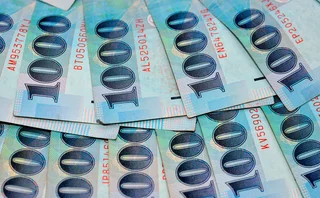
Non-US airlines profit from low-flying dollar
The weak dollar is giving airlines outside the US some relief from the impact of high fuel costs, according to their latest financial results, reports Risk’s sister publication, FXWeek .
Japan Airlines said exchange benefits amounted to ¥9.3 billion ($84.5 million) in its air transport segment for the six months to September 30, helping it report a net profit of ¥83 million, against a net loss of ¥57.6 million for the correpsonding period last year.
The average dollar/yen exchange rate in the six months to September 30 was ¥118.7, compared with ¥109.7 in the corresponding period of 2003.
British Airways said it had made £4 million ($7.3 million) from the weakening yen rate against sterling in its second quarter – British Airways' financial year runs from April 1 to March 31.
The unexpected boost to the firm's balance sheet came after a charge of £58 million for the same period the previous year.
Keith Williams, group treasurer and head of tax at British Airways in London, said that while his firm is fairly neutral to sterling/dollar exchange rates, as a large proportion of its revenues as well as costs are dollar-based, "at current weak dollar rates, it becomes incumbent on the treasurer to lock in some of the benefit".
He said European airlines facing large increases in their fuel costs generally welcome a weak dollar as it offsets some of the price increase on the fuel itself. "It also reduces some of their other dollar costs, for example, aircraft costs and landing charges."
But although US airlines faced the double whammy of high oil costs and a weak domestic currency, only those with large Asian operations, such as Northwest, United and to a lesser extent Continental, have done any significant currency hedging, said Glenn Engel, airline analyst at Goldman Sachs in New York. These companies have far more yen revenues than yen expenses, so they try to lock in a profitable yen/dollar rate and prefer a weak dollar, he said.
Only users who have a paid subscription or are part of a corporate subscription are able to print or copy content.
To access these options, along with all other subscription benefits, please contact info@risk.net or view our subscription options here: http://subscriptions.risk.net/subscribe
You are currently unable to print this content. Please contact info@risk.net to find out more.
You are currently unable to copy this content. Please contact info@risk.net to find out more.
Copyright Infopro Digital Limited. All rights reserved.
As outlined in our terms and conditions, https://www.infopro-digital.com/terms-and-conditions/subscriptions/ (point 2.4), printing is limited to a single copy.
If you would like to purchase additional rights please email info@risk.net
Copyright Infopro Digital Limited. All rights reserved.
You may share this content using our article tools. As outlined in our terms and conditions, https://www.infopro-digital.com/terms-and-conditions/subscriptions/ (clause 2.4), an Authorised User may only make one copy of the materials for their own personal use. You must also comply with the restrictions in clause 2.5.
If you would like to purchase additional rights please email info@risk.net
More on Foreign exchange
Will Taiwan lifers ramp up FX hedging amid tariff turmoil?
As TWD remains strong against the US dollar, Taiwanese life insurers are still poised to act
Deutsche Bank takes AutobahnFX on the open road
Proprietary trading platform sets out new workflow-based approach to collaborating with venues
Dealers bullish on Bloomberg chat interface for FX markets
Service expanded its API offering to integrate broker chats into banks’ engines for cash FX pricing late last year
LCH expects to boost deliverable FX clearing with new adds
Onboarding of dealers and link-up with CLS could swell interbank deliverable FX clearing volumes
Does no-hedge strategy stack up for mag seven mavericks?
At Amazon, Meta and Tesla, the lack of FX hedging might raise eyebrows, but isn’t necessarily a losing technique
Amazon, Meta and Tesla reject FX hedging
Risk.net study shows tech giants don’t hedge day-to-day exposures
Intraday FX swaps could signal new dawn for liquidity management
Seedling market could help banks pre-fund payments in near-real time and reduce HQLA requirements
Natixis turns on the taps in flow trading
French bank boosts flow business, balancing structured solutions capabilities







